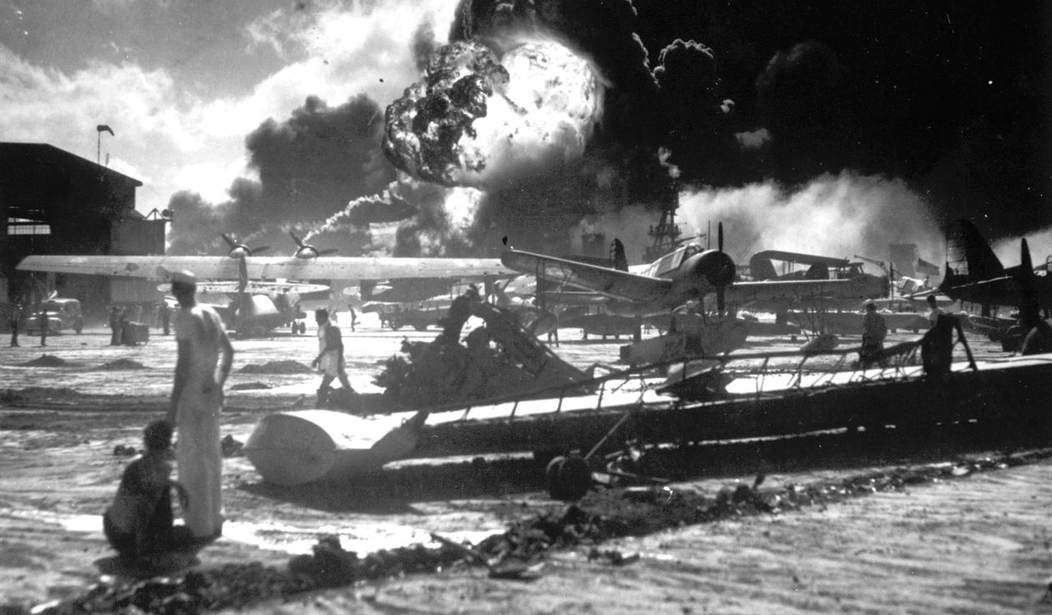You never know what might set off a major war.
An Austrian Archduke on a tour of his empire’s latest Balkan acquisition is assassinated by a Serb national, and two months later all of Europe is at war with itself in a conflict that will eventually reach the Middle East, East Africa, the Pacific Ocean, and even in the submarine-infested waters right off America’s east coast.
All of this because Metternich’s “Concert of Europe” — which had held the general peace since 1815 — had been shattered by a rapidly industralizing Russia
“The War to End All Wars” had so ravaged Europe, even the victors, that liberal-minded governments decided that disarmament and appeasement would help avoid future conflicts. That’s why on September 1, 1939, Adolph Hitler assumed that Britain and France would idly stand by as he ordered the Wehrmacht into Poland.
They did not, and a local war went global like none other.
Despite Hitler’s bad gamble, two years later Nazi Germany’s possessions, annexations, and occupations would encompass almost all of Europe. From France and the Low Countries, to the Balkans, to the gates of Moscow (and even nearly to the walls of Alexandria), the Nazis reigned supreme. Less than three years later, Germany would lie in ruin, divided and occupied by the victorious Allies and the Soviet Union.
All of this in large part because Hitler wanted a war he assumed Britain and France wouldn’t fight.
A global thermonuclear war was almost begun on and around the island of Cuba, where Soviet strongman Nikita Krushchev unwisely figured the United States would accept basing Soviet nuclear missiles.
Sometimes a major war starts with a slow burn.
The 1990-91 Gulf War was everything you could ever want in a war: Limited in its aims, short in its duration, and with shockingly few friendly casualties.
And yet…
The sight of Western troops on Saudi soil — well, on Saudi sand — was enough to drive Osama bin Laden mad with terroristic rage. He brought down the Twin Towers on September 11, 2001. What would follow was a series of conflicts stretching from Afghanistan and Iraq, to Syria and the Horn of Africa, and even our own streets as jihadis everywhere took up both bin Laden’s deluded cause and his vile methods.
The Forever Afghanistan War, the Iraq War, the Syrian and Libyan civil war, ISIS, jihadi attacks on American nightclubs, all have their roots, or at least some of them, in the terror attacks 20 years ago this September.
I don’t know what future historians will call all these conflicts, but I’m certain they’ll see them all as mere parts of a greater whole.
I’ve been thinking about what might set off the next global conflagration, and like contemporaries in 1914, 1939, 1962, and 1990, I have no idea what it will actually be.
What I do know is the world is ripe for one.
One obvious potential villain is Communist China under the leadership of strongman Xi Jinping. China combines some of the most destabilizing features of both Wilhelmine Germany in the early 20th Century and Imperial Japan of the 1930s.
Like newly-unified Germany of the late 1800s, Communist China has industrialized rapidly and completely. The CCP has territorial ambitions far beyond the South China Sea, and would eventually like to replace the United States as the sole superpower in the Pacific west of Hawaii.
China’s ongoing naval buildup is a testament to that desire, and is reminiscent of Imperial Japan’s rise as a naval power.
A global war could start with a spark in the South China Sea, in the Himalayan passes, or even in a collapsing North Korea.
As a deadly bonus to all that, China still harbors long memories of various humiliations forced on them by Western nations in the 19th Century.
In Vladimir Putin’s Russia, we have a country both paranoid about Western intentions and contemptuous of Western resolve. That’s a formula for the kind of revanchism we’ve seen Russia indulge in Crimea and eastern Ukraine in recent years, and perhaps more dangerous adventurism in the future.
Whatever actions Putin takes, I’ll go on the record now that his rejection of joining the West during Communist China’s ascent will go down as one of history’s greatest geopolitical self-owns.
Going further afield from a map of national interests and armed forces, we can see even more potential flashpoints: A nuclear weapon wielded by terrorists, an even worse virus escaping a Wuhan lab, a “lights out” cyberattack on America’s energy grid, a resumption of Arab-Israeli hostilities in the oil-rich Middle East as America’s Democrats purposely squander our renewed energy independence.
What I don’t mean to do here is engage in any fear-mongering: Global war is not inevitable.
It isn’t often appreciated, but World War One almost kicked off a couple of years early during the Moroccan Crisis between Germany and France — but wiser heads prevailed. President John Kennedy and his Executive Committee devised a novel solution to the Cuban Missile Crisis, allowing both sides to back down before committing to the unthinkable. President Ronald Reagan, more than any other single person, saw the Soviet Union’s weak spots and set us on a path to winning the Cold War without a shot.
Critical thinking can prevent a war just as surely as hot tempers or simmering passions can start one.
The important thing is to analyze potential hot spots — as I’ve tried to do in some small way today — long ahead of time, in order to lay the foundation for the critical thinking necessary for wiser heads to prevail when the proverbial stuff hits the metaphorical fan.










